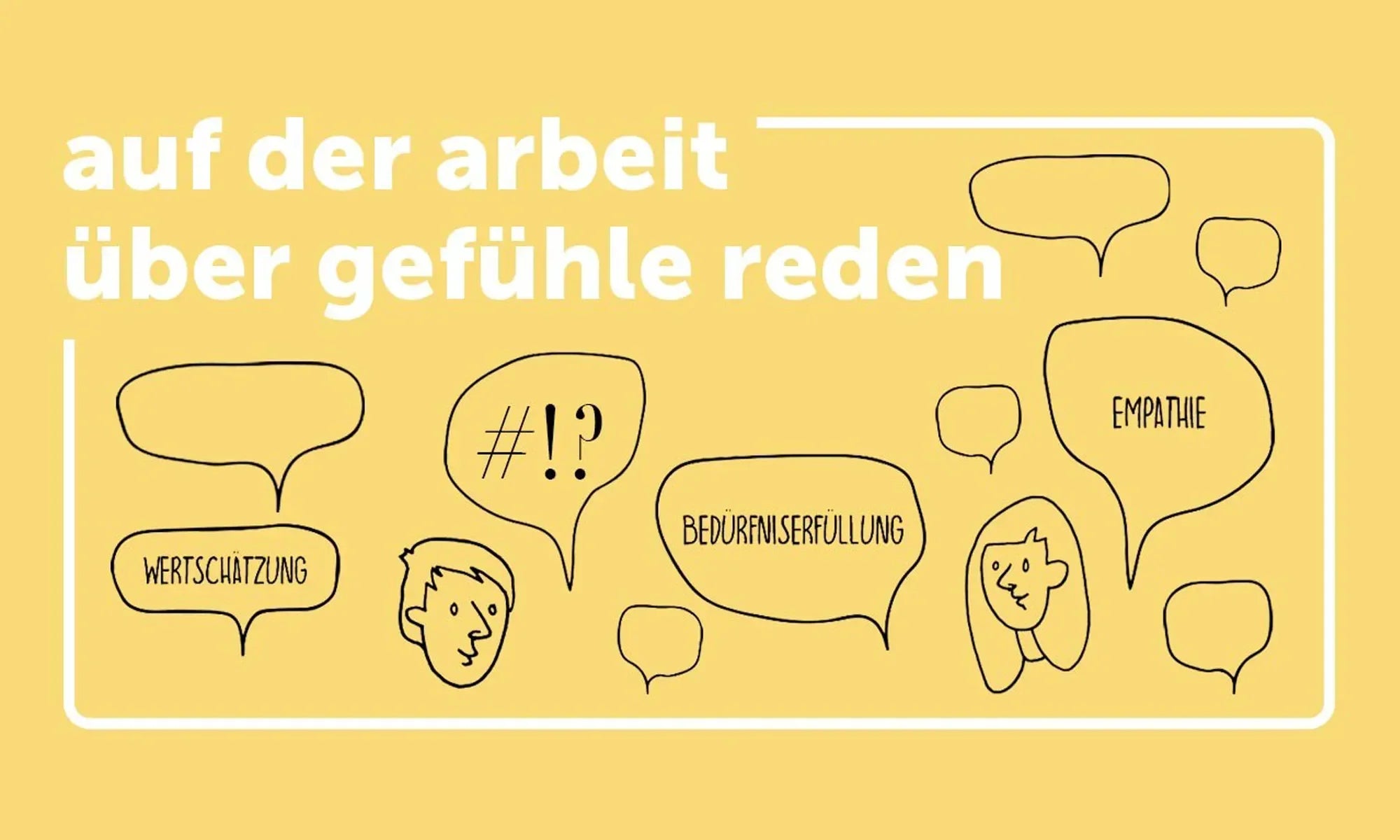
Talking about feelings at work & other hippie nonsense: non-violent communication at soulbottles
UPDATE
Since our company was founded, we have been working with non-violent communication. But what is that actually? And why was it so important to Paul and Georg to incorporate NVC into soulbottles? In this blog article, Paul explains how he came to use NVC and what it can do for work.
A long, long time ago... when soulbottles didn't even exist yet, I met Georg while waiting tables in the Vienna Hofburg. We were both so-called Numerus Clausus refugees , i.e. Germans who had come to Austria to study because their grades were too bad. When we arrived in Vienna, Georg and I didn't really study much anyway. He wanted to start a social business and I wanted to play punk rock.
A year before he came to Vienna, Georg had completed a trainer training course in Nonviolent Communication (NVC) and was now giving workshops in it. As a good friend, I naturally came along and listened to everything with interest (even though Georg unfortunately didn't come to my punk rock concerts in return).
When I think back today to what has held soulbottles together over the years, non-violent communication is right at the top of my list.
what is nonviolent communication actually?
Whole books could of course be written about this topic. And they have been. Here are just two recommendations, both from Marshall B. Rosenberg, who developed the concept: Non-violent communication - a language of life and resolving conflicts through non-violent communication. Incidentally, every new soulbottles employee receives the second one as a gift when they start work. So I won't even try to explain everything here, it has simply been done much better elsewhere. Even the Wikipedia article is pretty good. I would rather try to answer three questions here:
-
What does GfK actually bring to the company level?
-
What exactly do we do at soulbottles?
-
...and is it worth it?
GfK in everyday business life – a judgment-free space
For me, one of the most important elements of NVC is the fundamental belief that everything people do is an attempt – more or less successful – to fulfill positive human needs. Needs that we all have.

on the shoulders of INEK Training
In the broadest sense, everything you can learn by reading books or attending seminars is based on this. Many people know NVC primarily as a “conflict resolution tool” or as a “language guide”, but for me there is much more to it than that.
If I assume that everyone has the same needs, I can also feel empathy for everyone and put myself in everyone's shoes. Of course, this is more difficult in certain situations than in others; for example, when I am feeling a lot of stress or anger, or when people are behaving completely against my values.
A key distinction in NVC is between need and strategy. Strategy is the individual way of fulfilling a need. Conflicts often arise at the strategy level. For example, if someone fulfills their need for community and belonging by joining a right-wing extremist gang, I find that extremely problematic. If they then hit me because they want recognition and respect from their friends, I've probably reached the end of my empathy capacity. But I know the need for community, and I can also understand the desire for recognition and respect, at least on a need level. Feeling empathy with someone doesn't mean that you agree with their choice of strategy or that you have to tolerate such behavior.
Now, such extreme situations rarely occur in everyday working life. But there are often moments when people have different opinions about something, are annoyed with others, or have their expectations disappointed. And sometimes these people clash. Often these same people don't "dare" to say certain things for fear that others won't understand them, will judge them, or the relationship will suffer.
But if I bring an attitude in which I at least try to be empathetic with everyone and at the same time can expect that others will treat me in the same way, then a very exciting space is created. Something that we at soulbottles call the "judgment-free space".
When I ask people what their best friendships are like, they often say things like "we can just tell each other anything" or "we've been through good times and bad." Interestingly, I often get almost the same answer when I ask what made the best boss in life. That's exactly the basic atmosphere we want to create at soulbottles.
what are the effects?

The effect of GfK at soulbottles is not that easy to grasp and not easy to put into words, but here are some statements that I hear again and again about the “working atmosphere” at our company:
-
I feel more secure, I feel less tension, I don't have to prove anything to anyone
-
There is a lot of honesty and I don't have to worry about anyone gossiping about me
-
I trust that my colleagues are happy with me, otherwise they would say something
-
I have more fun here and don't have to pretend
-
I am accepted here as I am
-
I have easier access to my creativity because everything is “allowed”
-
It is easier for me to take personal responsibility here
-
There is much less “office warfare” here, i.e. fewer conflicts that simmer under the surface and are not addressed
-
There are fewer “ego trips” and everyone has a chance to speak in meetings
-
I feel more productive, I don't have to strategize, but can concentrate on the essentials
I can understand most of the statements well, although my experience in other organizations is quite limited.
What does this look like specifically at soulbottles?
Creating and maintaining such a space is not easy and takes time and work. And from a founder's perspective, being a role model is essential at the beginning. Georg and I made it clear from the start that conflicts are normal for us and that we see them as opportunities to learn. Of course, that's totally start-up talk and many people say that. But we went through with it quite conscientiously and tried to really live it every day. We never hid it when we didn't agree, and we also openly discussed some disputes - but at the same time we never lost our appreciation and empathy for the other person.
Other measures have grown over time: Nowadays, almost every meeting starts with a check-in , i.e. the question "How are you doing right now?" We see this as an invitation to take a moment to check in with yourself and see what is coming up, to share it and then let it go so that you can concentrate as best as possible on the meeting.
It could be anything from “I’m doing great because we’ve just had my favorite meal and I’m full and happy” to “I’m really stressed at home because I had an argument with my roommate.” Or maybe it’s real sadness and fear because someone in the family is sick. All new “soulies” have the opportunity to attend a NVC introductory workshop with us – they usually last 2.5 days and teach you the basics. I can recommend a workshop like this to anyone in good conscience. Employees who have been with us for more than a year have the option of doing intensive NVC training, which is usually 20 days of training spread over a year. The training offers the opportunity to practice and deal intensively with your “own issues.”
We go on team days twice a year. Of course, many companies do that. But in my experience, this often leads to rather superficial "team building exercises". They are fun and can be useful, but we have noticed that we get the most out of it when we retreat to a farm in the country in a really "hippie way" and do "community work". For this, we bring in external trainers who have experience from communities and eco-villages, for example. And yes, in the evenings we sometimes sit around the campfire with the guitar. (Due to Corona, the last team days had to take place mainly offline. But we are really looking forward to hopefully doing them in real life again soon).

Once a month there is a personal relation meeting at soulbottles. This is voluntary and open to everyone. We come together, turn off computers and cell phones, close the door and calm down a bit. The meeting is moderated and usually consists of 4 rounds:
First, we take the time to listen to what is going on with each individual. We call it "celebration & regret," meaning we simply share what is going well and what is perhaps not going so well, regardless of whether it has to do with work or private life. It is important that we neither interrupt nor comment; but really give the individual the space to communicate what he or she needs and feels at the moment.
In the second round we ask the question "Are there any conflicts with anyone in the room that I would like to address?". Sometimes the room gets a little tense. We always encourage people to address even small irritations and moments of frustration. Since we have a moderator, we can usually clarify many things in the meeting.
The third round is the appreciation round, because saying thank you is often neglected in our stressful everyday lives. That's why we specifically open up the room with the question "is there something you are grateful to someone in the room for?"
The last round is a short check-out with the question “How are you now, how was the meeting for you?”, with which we end our meeting.

... and is it worth it?
When I talk about what we do at soulbottles, I sometimes get the response: “What a cost! It can’t possibly be worth it.” I would therefore like to look at the topic from a business perspective:
In 2018, we spent around 0.5% of our turnover on training and further education. The GfK part definitely took in the largest part, but compared to other companies, it is still completely within the scope. A soulie also invests up to 5% of their working time in further education and training or in group work such as the personal relations meeting. If you add that to the expenses, you get around 1.5% of turnover.
From my entrepreneurial perspective, I think to myself when I look at these figures: If, for this price, I can avoid the blockade and trench warfare that I see in other companies; and if I can use the potential of our employees better and encourage self-responsibility and creativity, then that is a really good "deal". (And that's even if I would like to be much less "decisive" in my everyday life - there is another interesting article on this).
Of course, I don't know what soulbottles would look like without GfK, but I look back on the years with great gratitude and look forward to the future with great anticipation. And yes, I would do it again!
further recommendations & links
Georg and I did our intensive training with Klaus Karstädt. There are still videos with him on YouTube . He no longer gives seminars; he died in 2018.
I did my mediation training with Alexandra Boos and Markus Fischer , with whom we also work a lot on the intensive training courses. Markus also has great videos on Holacracy and non-violent communication on YouTube .
Introductory workshops in Berlin can be done well with Marius and Charlotte .
Miha from the Conflict School supports us with workshops, mediations and much more.
At ZEGG we just started doing our team retreats; there are events and seminars there on many different topics.
And of course you can also contact us for guided tours, keynote speeches and workshops if you want to have the full “soulbottles experience”: Just write to us at hello@soulbottles.com.


